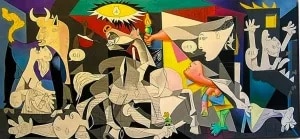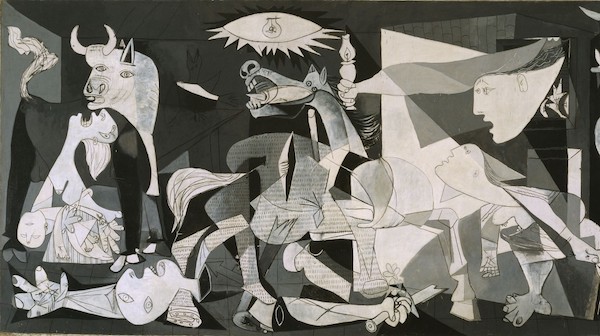
Pablo Picasso’s Guernica, 1937
To say that I was awed is an understatement.
Standing in front of Picasso’s 11.5 ft. x 25.5 ft. celebrated painting Guernica is one of the most sobering encounters I’ve had the displeasure of experiencing. Displeasure because the massive composition’s theme is revoltingly gruesome. Since that dastardly first-of-its-kind-waging-of-wars, nations have not learned to abide by and practice peaceful and harmonious existence.
World War 2 was followed by wars in Hiroshima/Nagasaki, Korea, Vietnam, Cambodia, Laos, the Near East/Palestine (8 wars), Iraq, Iran, Afghanistan, Libya, Ukraine, Yemen, and Gaza, to name but a few. And in each of these wars massive bombings and aerial bombardment have been the weapon of choice, resulting in the death of millions of human beings.
Aerial bombardment is brutal, heinous, and vicious. Aerial bombardment is the cowardly weapon of arrogant, fascistic, hegemonic, and egotistical maniacs. Aerial bombardment is the screen behind which powerful thugs hide to absolve themselves of crimes against humanity. Aerial wars’ indiscriminate annihilation of mostly innocent civilians, reducing them to paupers and beggars, goes against every decent norm.
For well over 35 years I’d been showing Guernica to my students, expounding on the painting’s blending of a heinously ghoulish theme executed in the cubist style on a-never-seen-before massive scale. One of the world’s most prominent museums, Madrid’s Museo Reina Sofia, is finally home to this one-of-a-kind artistic expression bearing witness to ghastly human depravity.
On my last visit to Spain some 12 years back, I spent well over an hour studying Picasso’s ingenious blending of form and theme in monochromatic colors. Standing in front of the composition, I viewed it from every angle, and I relived years of lecture terms, phrases, descriptions, questions, answers, student responses/opinions, and so much more.
On April 27, 1937, mostly German and Italian warplanes conducted the first large-scale aerial bombardment on the town of Guernica. Nestled in northern Spain and with the complicity of Franscico Franco, Spain’s Fascist dictator, the Germans wanted to test their newly fabricated war machinery—the Nazi Luftwaffe’s planes and their newly designed bombs—produced solely for destruction on a massive scale. Because of its remoteness, Guernica was chosen as the perfect out-of-sight out-of-mind target.
Like today’s Gaza, Guernica was reduced to massive rubble shrouding innocent civilians whose flesh, blood, bones, and sinews cloaked the bleak landscape of rubble, rebar, and crater-size pocked apocalyptic destruction where once high-rise structures, streets, and alleyways existed. And hospitals, ambulances, mosques, churches, and schools are being targeted—deliberately and mercilessly.
In response to this nightmarish bombing, Picasso isolated himself in his studio for a lengthy time and vented his fury by working long hours and in isolation on what is perhaps the world’s foremost artistic political statement.
Here is what I see today in Picassos’ composition: to the far right is a Gaza woman holding her arms to high heaven; she is screaming, pleading, imploring the gods for deliverance. At the top is a light, accompanied by a hand holding a lamp as though to shed light on the unfolding carnage. Call this the 90 plus journalists killed by Israeli snipers and drones so as to draw a curtain on what God’s chosen are doing in Gaza, today’s “graveyard of children.” In addition to its military strength, Israel is adept at conducting its carnage under the cover of dark. And its powerful choking of U.S. media is adept at portraying it as the victim. To the top left Netanyahu and Co., along with Biden and Co., prance bullishly over the devastation as they squash the emaciated mother holding on to her dead infant. How many white shrouds have to be buried to appease the Hebraic God of revenge? And how many corpses have to be pulled out, with bare hands, from under the rubble? And how many tattered remains have to be placed in makeshift bags? Careful scrutiny of the foreground depicts newsprint, Picasso’s manner of telling the world “I am Guernica: Remember Me, Remember What Heinous Crimes You’ve committed.” And the crushed supine figure holding onto a broken weapon represents trampled, crushed justice under the weight of brute force.
It is worth noting that while Peter Paul Rubens, Pieter Bruegel the Elder, and scores of mostly European artists have produced a massive volume of compositions under the title Massacre of the Innocents, a theme associated with Herod (the Not so Great), King of Judea, and around the time of Christ’s birth, Picasso’s Guernica stands in a class of its own.
And is it not ironic that right around the time Christendom is about to celebrate the birth of its Savior, the Prince of Peace, the Redeemer, the Israelis are raining down 2000-pound bombs, some of them the awful phosphorus kind that vaporize their victims? To date the equivalent of three Hiroshima/Nagasaki bombs have been dropped on a starved, thirsty, disoriented 2.3 million displaced citizenry.
And could we say that to date, timed with Christmas 2023, Israel has massacred over 8,000 thousand innocent children—and counting. And the West, today’s bastion of Christianity, is abhorrently supportive and silent?
Yes, in the last few years Fascism has slowly sneaked into our halls of justice, our public spaces, our airwaves, and our digital formats. Joe “I am a Zionist to the Core,” Netanyahu’s puppet and apologist, has draped himself in the Israeli flag and has fashioned and emblazoned his tie, his shirt, his suit, and his rhetoric in the same style and rhetoric of Netanyahu, his alter ego and master.
On December 10, 2023, Spain, the only Western nation with the moral fortitude to express its outrage at the Gaza carnage, held a solidarity event in the Basque city of Guernica’s market square, the same square that was bombed by the Nazis and Fascist forces way back in 1937. An aerial view depicts a massive Palestinian flag (the size of the entire square) in mosaic form the tesserae of which were held by citizens, trade unionists, artists, anti-war and anti-fascist groups, along with a large depiction of Picasso’s image depicting the mother, her child in her arms, crying to the high heavens.
And for a whole minute the sirens blazed in solidarity with Gaza’s mothers and children.
Viva Espana. Viva Palestina.
Raouf J. Halaby is a Professor Emeritus of English and Art. He is a writer, photographer, sculptor, an avid gardener, and a peace activist. Courtesy: CounterPunch.

